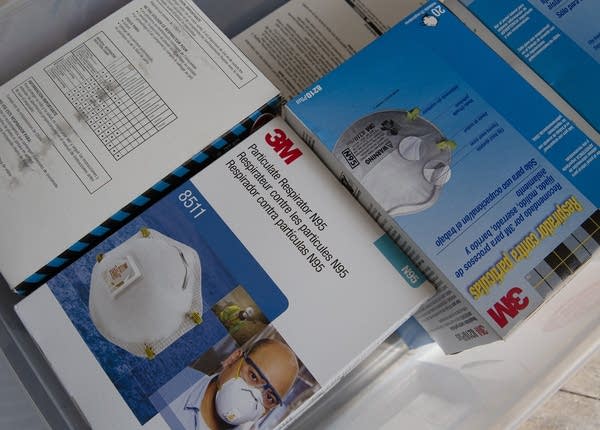Trump touts end of dispute with 3M over protective masks

Go Deeper.
Create an account or log in to save stories.
Like this?
Thanks for liking this story! We have added it to a list of your favorite stories.
Updated: 7:58 p.m.
President Trump is touting the end of a dispute with 3M to supply millions of masks to medical professionals on the front lines of the fight against the coronavirus.
Trump said that the “3M saga ends very happily. We’re very proud to be dealing now with 3M.”
The president said that the Minnesota-based company agreed to deliver an additional “55.5 million high-quality facemasks each month.”
Trump had invoked the Korean War-era Defense Production Act to prevent 3M from exporting masks abroad.
Turn Up Your Support
MPR News helps you turn down the noise and build shared understanding. Turn up your support for this public resource and keep trusted journalism accessible to all.
It had sparked some fears that other nations would down on the shipment of medical supplies to the US.
3M said the agreement allows it to continue to send N95 protective masks to Canada and Latin America.
Earlier, President Trump had used his authority under the 1950 Defense Production Act to stop exporting such masks, also known as respirators. The move to block such masks, which are crucial in protecting health care workers on both sides of the border from the virus that causes COVID-19, outraged many officials in Canada.
3M argued that blocking exports would raise “significant humanitarian implications” abroad and lead other countries to retaliate by withholding much-needed medical supplies from the U.S. The company is a major producer and exporter of face masks used to protect health care workers from the coronavirus.
Nearly all of 3M’s exports of high-grade N95 masks go to Canada and Latin America, and Canadian officials led by Prime Minister Justin Trudeau took the company’s side. They lobbied Trump administration officials not to cut off part of their supply.
Late Friday, the president announced that he will direct the Federal Emergency Management Agency to prevent the export of N95 masks, surgical gloves and other medical protective gear. He said exceptions might be made to help Italy and Spain, which have been hit hard by the coronavirus outbreak.
“We are not happy with 3M,” Trump added during a White House briefing.
The spat between the president and a leading American manufacturer started Thursday, after Trump used his authority under the 1950 Defense Production Act to direct the government to acquire the “appropriate” number of N95 respirators from Minnesota-based 3M and its subsidiaries.
The N95 masks, also called respirators, provide more protection against the virus that causes COVID-19 than do ordinary surgical masks. Governors and hospital officials around the country have warned of a dire shortage of masks and other protective gear for health care workers treating infected patients.
The president followed up his order with a barbed tweet Thursday night.
“We hit 3M hard today after seeing what they were doing with their Masks. ‘P Act’ all the way. Big surprise to many in government as to what they were doing - will have a big price to pay!” Trump tweeted.
The events leading to Trump's order against 3M began weeks ago. A White House official said when Vice President Mike Pence visited a 3M factory in Minnesota last month, he was told that 3M had 35 million N95 masks that were intended for commercial uses but could be used by health care workers.
This week, after 3M received liability protection that it sought, the White House learned that not all of those masks were ready for the U.S. market, the official said.
The fight with 3M, while unusual, is not unprecedented. Just last week, Trump invoked the same 1950 law to force General Motors to build ventilators used to treat COVID-19 patients.
Trump accused GM of not moving quickly enough to ramp up production, and of trying to overcharge the government. GM said it had been working on ventilators for weeks. Two days later, Trump praised the auto maker, saying it was “doing a fantastic job.”


